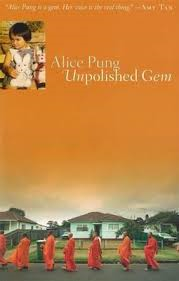One Hundred Days by Alice Pung
I’m an Alice Pung-fan. I liked Unpolished Gem, Laurinda and can now add her latest novel One Hundred Days to the list.
One Hundred Days is set around the mid 1980s in Melbourne. Karuna, the narrator, was 16 years old and pregnant when she began telling her story to her unborn baby.
After Karuna’s parents separated she and her mother moved into a two-bedroom flat on the fourteenth floor of an inner city Housing Commission tower in Melbourne.
The first time I saw one of these towers, I was horrified. At that time I was a child living on a farm and I found the height of the towers and their bland appearance to be frightening. Neither could I imagine how anyone could live in such a small space, boxed in with people living in flats on top of them, underneath them and beside them. I can’t imagine living in such close proximity to so many other people but now I realise that the apartments in the towers are people’s homes, that the residents benefit from being close to the CBD and public transport and that for those with mobility issues, finance issues or for a myriad or other reasons, the towers provide the opportunity to be part of a community.
At first, I thought Karuna’s mother was crazy, and not just because she insisted on sharing a bed with her teenage daughter, leaving the other bedroom in their apartment for storage. Grand Mar, as Karuna called her in the story, locked Karuna inside their flat for what she said was her own good and was extraordinarily tight with money, refusing to give Karuna a birthday party or allow Karuna to buy junk food. When Karuna’s father gave her money, Grand Mar stole it from her.
Karuna hid her pregnancy from her mother for as long as she could. Grand Mar was horrified when she realised, and insisted to anyone who would listen that Karuna had been tricked by a boy. Surprisingly, Grand Mar stood by Karuna, all the while lamenting her own bad fortune at having married a no-good man herself, then having her daughter do this terrible thing to her.
Worst of all though, in Karuna’s eyes, Grand Mar insisted that when the baby was born she would be the mother and that Karuna would be the baby’s sister.
Karuna told her story as if it was a letter to her baby. She explained how she fell pregnant – not quite by accident, but not exactly meaning to, either.
As the story went on, I realised that Karuna’s mother was living her life according to the values she had brought with her from the Philippines and that she loved and wanted the best for her daughter. She worked two jobs and spent her hard-earned money on delicacies such as Balut, a steamed, fertilized bird egg for Karuna to eat during her pregnancy, believing that such food would be nourishing for her daughter.
The one hundred days of the book’s title refers to the hundred days after Karuna gave birth, for which her mother had been saving her money so that Karuna and the baby could stay at home, safe and loved and protected.
Karuna’s story was sad, but the book was also filled with humour and love and hope. Grand Mar may have been one of the most annoying and deluded women in Melbourne, but as Karuna matured she found herself able to stand up to her mother when it counted, and was able to negotiate with her mother for what she thought would be better for herself and her baby, while still allowing her mother to love her and for her to love her mother without being abused, coerced or controlled.
My purchase of One Hundred Days by Alice Pung starts off to meet my New Year’s resolution for 2022 to buy a book by an Australian author during each month of this year (January).
I purchased this book from Ironbird Books in Port Fairy.



Recent Comments